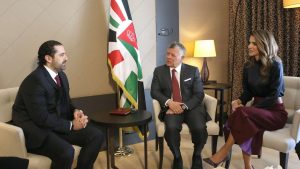The talkathon-cum-thinkfest that blazed to an end on January 26 at Davos had more leaders and executives from the Arab world in attendance than at any time since it began.
The World Economic Forum, to give the high-achievers’ annual conclave its proper name, has been around in one form or the other since 1971. This year, the Middle East and North Africa region appears to have seized the initiative and set out to impress.
Did it?
It was certainly prominently present. Seven sessions focused on the region — three straight-up conversations with heads of state or government and the others were broad-based discussions on the future of governance, the need for a new equilibrium, imperatives for Levantine peace and the regional context of Saudi economic growth.
The last time Davos was so consumed by the Arab world was in 2013. The Syrian war had run two years and refugees were haemorrhaging into the region (but not yet into the wider world). The Arab uprisings had come and gone and Davos 2013 heard the leaders of Egypt, Lebanon, Libya, Morocco and the Palestinian territories offer sober commentary on the transformed landscape and the hard task of managing people’s exaggerated expectations.
In some ways, 2013 was a simpler age. The Russians had yet to properly muscle their way back into the region as saviour and patron but also as antagonist and false messiah. The United States had not abandoned all pretence of seeking a just peace for Palestinians and Israelis. There was still hope the Syrian conflict could be sensibly managed with President Bashar Assad stepping aside and the country building a new political future.
That sense of tremulous hope is gone and the regional realities are harder-edged.
There is a palpable sense of regional urgency about the phenomenon that’s snappily (and somewhat inaccurately) called the Fourth Industrial Revolution or 4IR. This was clear at Davos.
Klaus Schwab, the German engineer who founded the Davos jamboree, has long beaten the drum for 4IR. But it is not clear if digitalisation that allows us to “blur the lines between the physical, digital and biological spheres” is wholly different from the Third Industrial Revolution, which changed our lives with personal computing and the internet.
No matter. MENA, everyone says, must make sure it doesn’t miss the 4IR. It must harness the forces unleashed by artificial intelligence, robotisation, automation, the internet of things, driverless cars and cyber-weapons to drive economic innovation and growth.
It is an attractive idea and an even better mantra. The danger lies in turning 4IR-readiness into a display event rather than an organic process of transformative strategies and painful take-up.
As academics Nicolas Colin and Bruno Palier, who variously work on entrepreneurship and technology and social investment policies, have noted, in this century, uncertainty will be the new normal. “Stable, long-term employment with a single employer will no longer be the norm and unemployment or underemployment will no longer be a rare and exceptional situation,” they say. “Intermittence will increasingly prevail, with individuals serving as wage earners, freelancers, entrepreneurs and jobless at different stages of their working lives.”
How would that affect the overwhelmingly young people in the MENA region, many of whom expect the state to provide, nay ensure, employment? It is surely foolhardy to talk of the future solely as an opportunity rather than as a struggle as well.
The rush to embrace the linguistic zeitgeist — inclusive growth — has thrown up some interesting diversions. The Saudis, more particularly Crown Prince Mohammed bin Salman bin Abdulaziz’s MiSK Foundation, laid on the “Tomorrow’s jobs” art-in-progress project, which may have been nothing so much as speculative. After all, by 2020, more than one-third of the skills now considered key in the world of work will be rather marginal. Tomorrow’s jobs will require creativity and the cultural space within which to adapt. Besides, no one can confidently predict what those jobs will be.
On January 22, the night before Davos (and the “Tomorrow’s jobs” project with concept artist Florian de Gesincourt) began, global management consulting firm Accenture released research on the future of work. It must be “re-imagined… create new customer experiences…and scale up new skilling,” it said if the age of [artificial intelligence] (and the 4IR) is not to overwhelm us.
That is a manifesto that needs no fancy artwork.


